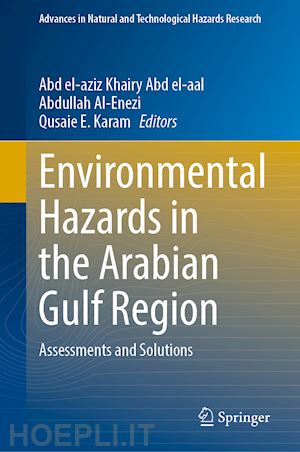
Questo prodotto usufruisce delle SPEDIZIONI GRATIS
selezionando l'opzione Corriere Veloce in fase di ordine.
Pagabile anche con Carta della cultura giovani e del merito, 18App Bonus Cultura e Carta del Docente
This book discusses the environmental hazards in the Gulf countries (GCC). The publication of this book is of great importance to all those interested and knowledgeable in the field. Climate change leads to the occurrence of major environmental hazards that must be reduced by estimating the extent of climate change and developing appropriate solutions to mitigate those effects. Climate changes are produced indirectly as a result of human activities with uncalculated consequences. The process of climate change is always accompanied by catastrophic environmental problems such as global warming, high temperatures, storms, hurricanes, floods, desertification processes, air pollution, and the extinction of many types and forms of animals and plants.
The Gulf countries are located in the eastern part of the Arabian Peninsula where the crude oil is extracted in several fields. The states suffer from many environmental problems as a result of its geographical location, global climate change, and also from oil extraction operations. The problems include high temperatures, induced earthquakes, and pollution in the soil and marine coast, as well as desertification processes, sand dunes movement, and other environmental problems. Earthquakes are also recorded from and near the oil fields, indicating the link between the oil extraction process and the occurrence of earthquakes. Indeed, the environmental studies published in the Gulf state are very few and do not meet the need of the scientific community in region which need more important environmental publications that help in the great and rapid urban developments in the area.
1. Scope of the book and hazard classification.- Part 1. Seismic Hazard Theme.- 2. Induced earthquakes and its relation to oil productivity.- 3. Seismic hazard assessment in Kuwait.- 4. Predication and modeling of ground motion in Kuwait.- 5. Seismicity of Sultanate of Oman and its surrounding.
Prof. Abd el-aziz Khairy Abd el-aal is a geologist and geophysicist. He is now working at Kuwait Institute for Scientific Research, Kuwait, since 2019. In 1999, he joined National Research Institute of Astronomy and Geophysics (NRIAG) Helwan, Egypt. Formerly, he was the director of Egyptian National Seismic Network (ENSN). He obtained a Bachelor's degree in Geological and Geophysical Sciences with a very good grade with honors from the Faculty of Science, Sohag University, Egypt, in 1992. In 2003, he received his M.Sc. in applied geophysics. In 2006, he awarded Ph.D. degree in applied geophysics. His research interests are mainly focus on engineering seismology, tectonics, hazard mitigation, seismic exploration. and environmental sciences. He was working in shallow and deep seismic group in NRIAG. He conducted many shallow seismic profiles and site investigation in different part of Egypt.
Dr. Abdullah Al-Enezi has more than 20 years of experience in the field of seismology and geology of arid land. Dr. Enezi is the program manager for the Crises Decision Support program. He is also the operation manager of Kuwait National Seismic Network (KNSN). Dr. Enezi has published more than 30 refereed journal papers, 11 conference papers, progress reports, final reports, and 20 technical reports. Currently, he is the leader of projects related to seismic hazard assessment of Kuwait. He has done Ph.D. in Geology Department, Royal Holloway, University of London, UK; M.Sc. in School of Geology, Oklahoma State University, USA; and B.Sc. in Geology Department, Kuwait University, (1992) Kuwait. His research keywords are seismic monitoring and hazard assessment, natural disaster assessment for decision support, land degradation, desert geomorphology, and sand control measures.
Dr. Qusaie Ebrahim Karam has done Bachelor of Science—Double major in Petroleum Geology and Marine Biology, Acadia University, Canada, 1999, and Doctor of Philosophy (Ph.D.) in Aquatic Ecotoxicology from the School of Marine Science and Technology, the University of Newcastle Upon Tyne, UK, 2011. His thesis title is “Toxicity of Kuwait Crude Oil and Dispersed Oil on Selected Marine Fish Species of Kuwait.” His research interests are standards practices for safe and sustainable offshore oil exploration operations, standardizations safety levels in accordance with wastes generated from oil offshore exploration facilities such as artificial islands and oil rigs and platforms, etc. He has completed and participated in 24 research projects as a project leader, and task leader. Dr. Karam has published more than 40 papers published in peer-reviewed scientific journals, books, chapters in scientific books, and local and international conferences.











Il sito utilizza cookie ed altri strumenti di tracciamento che raccolgono informazioni dal dispositivo dell’utente. Oltre ai cookie tecnici ed analitici aggregati, strettamente necessari per il funzionamento di questo sito web, previo consenso dell’utente possono essere installati cookie di profilazione e marketing e cookie dei social media. Cliccando su “Accetto tutti i cookie” saranno attivate tutte le categorie di cookie. Per accettare solo deterninate categorie di cookie, cliccare invece su “Impostazioni cookie”. Chiudendo il banner o continuando a navigare saranno installati solo cookie tecnici. Per maggiori dettagli, consultare la Cookie Policy.